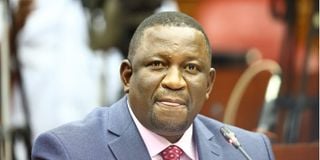Govt revokes at least 1, 500 mining licenses

Mining, Blue Economy and Maritime Affairs cabinet secretary Salim Mvurya
The national government has revoked at least1, 500 mining licenses. The move comes after the government finalized an audit of mining licenses.
Miners who possess expired licenses will be subjected to the same vetting process as those applying for licenses for the first time as they will have to go through the usual vetting process
The government has requested that miners whose licenses have been revoked, to reapply and that individuals interested in joining the mining sector also submit their applications as soon as the registration portal opens.
In an interview with the Nation, Principal Secretary of the State Department for Mining, Elijah Mwangi, said the government conducted an audit of minerals rights which covered mining rights for all metals and minerals issued up to date.
“The government department for mining has conducted an audit of the mineral rights in her cadastral as at December 2022. The audit recommends that 1546 licenses be removed from the cadastral due to either noncompliance with conditions of licensing, expired and no application for renewal lodged and failure to pay relevant dues,” said Mr Mwangi.
Also Read: Three counties to share Sh2.7bn mining cash
The PS, however, said the designated mining area, upon its release, will now be available for allocation to any qualifying individual, in line with the provisions of the Mining Act 2016.
To provide transparency and uphold due process, the PS said the government will publish a comprehensive list of the affected mineral rights.
“A comprehensive list of the affected mineral rights will be duly published, following all legal protocols. After the revocation of mining rights, interested parties must submit a fresh application and fulfill all the necessary criteria for consideration,” said PS Mwangi.
In 2019 the Ministry of Petroleum and Mining received communication from the Head of Public Service to impose a moratorium on the issuance of new mineral rights which was meant to block the companies that wanted to control acreage for speculative purposes.
The rationale for the issuance of the moratorium was, therefore, to safeguard Kenya’s interests by developing the right data and eliminate speculation on availability of substantial mineral deposits.
Mining, Blue Economy and Maritime Affairs cabinet secretary Salim Mvurya said the moratorium was perceived as a tool to assist government in better regulating the sector and avoid Kenya falling in the “Resource Curse” trap.
“The government was able to identify all expired and inactive licenses in its registry in order to remove them from official status, which would open up areas for potential investors. This was accomplished without issuing any new licenses,” CS Mvurya told the Nation.
“We have undertaken a comprehensive audit of all mineral rights holders with a view to cleaning existing data. With no new licenses being awarded, the government managed to find out all expired and inactive licenses within its register with a view to de-gazetting them hence freeing up areas for potential investors,” he added.
The CS said that his department has been carrying out mapping of illegal mining areas, profiling these activities and liaising with other government agencies to curb illegal mining operations and restore order, security and associated gains through strengthening the compliance, enforcement and inspectorate functions.
However, he said to have the moratorium lifted in view of the negative impact it has on the economy, the department has put in the necessary safeguards aimed at sustaining the gains already realized and inform decisions for the lifting of the moratorium.
“Towards this end, the ministry has undertaken a number of reforms aimed at inspiring the mining sector in the country and attracting investors to the sector, Conclusion of National Airborne Geophysical survey and generation of a preliminary report identifying over 970 mineral occurrences across the country, Initiating the process of ground-truthing in prioritized 16 counties with critical and strategic minerals,” He said
“We have concluded the development of an in-house, in-country mineral licensing system, an on-line mining cadastral integrated with national institutions like KRA, e-Citizen, and Business registration services among others. This will allow government broader control of all mineral rights and ensure timely issuance of mineral rights as stipulated in the Mining Act 2016,” He added.
He further noted that the ministry is optimistic that the ongoing reforms will create an attractive investment environment for mining in Kenya, and draw in the top players in the industry saying that they are also aware that the presence of Critical and Energy Transition Minerals presents an opportunity to capitalize on the high demand for these minerals.





